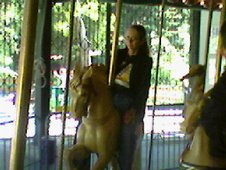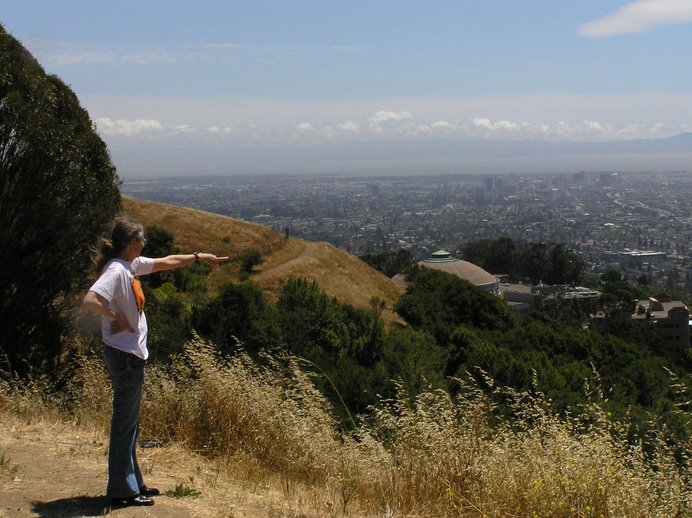


One Love, Part 1: Visiting a Combat Support Hospital in Iraq
Whenever I sit down to write something, the stories usually just seem to write themselves but that's not happening here so I guess I'm just gonna have to grind this one out the hard way -- with elbow grease. This is going to be a two-part story. Part one involves my tour of a Marine combat support hospital (CSH) at the Al Asad airbase in western Iraq. And both you and me will have to wait and see what Part 2 is going to be about.
Last October, I had e-mailed another reporter about how things seemed to be going really peacefully over here in Anbar province.
"Don't just naively believe everything that you hear, Jane," he e-mailed me back. "Before you go getting all mushy and teary-eyed about how well things are going over in Anbar, take a look at the airbase's combat support hospital -- where they bring in the casualties. When I was there this summer, all the beds were filled up with seriously injured soldiers and they lined the corridors too. Check it out."
Aha! So. They were trying to hide the true story from me, were they? No one keeps the truth from Journalist Jane! So I DEMANDED to see the CSH hospital.
"Well, sure," replied the airbase's public affairs officer. "When would you like to go? Would tomorrow be okay?" Yeah, I guess. So the next morning I stolidly set off to visit the CSH hospital -- totally prepared for the worst.
"If you had come here last summer," said the doctor in charge, "you would have seen every bed in the ICU taken and people sleeping on the floor of the operating room as well. But now? We only have 13 patients currently and most of them are Iraqis. It's been this way since September." Oh yeah? Then prove it. So we went on a tour.
"Here's the ER," said the doctor. Wow. It was super-equipped, looked as efficient and sanitary as our ER back home in Berkeley -- or better. No waiting around to fill out insurance forms here. And, unlike our ER in Berkeley, this one was empty.
"Soldiers arrive at the CSH by helicopter except when there's a sandstorm and then they are ground-evaced," continued the doctor. "Casualties first go to the triage tent where they are resuscitated and stabilized and then are sent off to Balad, Kuwait or Longsteul in Germany for further treatment if necessary. We try to med-evac them within three days. Combat wounds are usually evacuated. And this is also where we send the Angels off to Germany." The Angels? Oh. Dead soldiers.
Then the doctor showed me their MRI machine. "IED injuries usually involve concussions. We use this in order to diagnose them more accurately." I went through one of those machines once when some doctor thought I had Altzheimers. I didn't have Altzheimers, however. I'm just eccentric.
"And over here is our 12-bed ICU, with a full-time intensive care staff." All 12 beds were empty.
"And here is our general surgical ward. 20 beds." I saw a couple of Iraqis and their families and also one American soldier. Aha. At last. A casualty of war!
"What are you in here for, soldier?" I asked. IED concussion? Shrapnel removal? Bullet wound?
"A gall bladder operation, Ma'am." Oh well.
"They treating you well here, soldier?"
"Yes, Ma'am." Hmmm. The food did look good....
But I still didn't want to be too soft on the Marines because I had just finished watching a DVD entitled, "Caught in the Crossfire," a documentary about how American military forces had literally flattened Fallugah, a city of 250,00 people. Based on the Middle Eastern tribal tradition of an eye for an eye, however, apparently this would have been an understandable and acceptable form of warfare in Iraq -- Fallugah had given the top dog trouble and therefore Fallugah had then been shown the error of its ways -- graphically. End of discussion. This is the sort of thing that Saddam had done to the Kurds when they had stepped out of line and although the Kurds had really hated what Saddam had done, the Kurds had understood why he had done it. Saddam knew the rules. The Kurds knew the rules. As Thomas Friedman had written in his book, "From Beirut to Jerusalem," this sort of behavior is common in the Middle East.
But the big difference here is that, as far as the Middle East was concerned, it was Bush and Cheney who had broken the rules. Their scurrilous deceit and injustice were the reasons that Americans were in Fallugah in the first place. And the citizens of Fallugah just didn't understand. "If Bush wanted to rid the world of horrible dictators, why start with Saddam? Surely there were worse ones around...." So. One can blame the Marines for carrying out unjust and deceitful orders -- but it is Bush and Cheney who should be facing the Nuremberg trials. But I digress.
"We have 23 doctors rotating through this CSH," said the doctor in charge. "They work 12-hour shifts. We also have a lab for blood-work and a complete psychiatric staff. Last summer there was fierce combat and we were busy but not now. At this point in time, we are completely ready for anything -- but hope that we won't be needed. So far so good."
Then the doctor talked about the Hippocratic Oath and how they treat everyone here equally, American or not. "We've even treated insurgents who injured themselves while manufacturing IEDs. We take care of everyone, regardless of team colors. Our war is on disease."
"So," I asked, "have you been here for most of the war?" Five whole years of being up to your elbows in blood and guts must be really surreal.
I'm currently reading Thomas Friedman's book on Beirut where he talks about how people there coped with the ongoing stress of war. Regarding coping mechanisms, Friedman wrote that, "those who survived the Israeli invasion of Beirut in the best physical and mental health were those who learned how to block out what was going on around them that was not under their own control and to focus instead on their immediate environment and the things they could control." But what the freak could one focus on and control in a combat hospital ER!
"Actually, the doctors here don't stay here that long but rotate in and out," said my doctor/tour leader. "Every 18 months they come here and serve for 90 days and then go back home. I myself work at the Mayo Clinic for most of the year."
Then the tour came to an end and I was forced to realize that things really HAVE changed in Anbar. "Do you have any more questions?" asked the doctor. No, not really. I wasn't about to ask him where the CSH's stash of Girl Scout cookies was located or where on the base I could purchase the best souvenirs.
After seeing the CSH hospital, my level of concern about T-shirts and cookies seemed sort of trivial, however. Or, as Thomas Friedman said in his book, "Beirut's enduring lesson for me was how thin is the veneer of civilization, how easily the ties that bind can unravel.... Ever since I left Lebanon I have felt, no matter where I am, that I am living in [Steven Spielberg's Poltergeist] house, never knowing when a door might fly open and suddenly I will be face to face again with the boiling abyss I glimpsed in Beirut. I go to baseball games or to the theater, and I look around at all the people seated so nicely and wonder to myself how easily all of this could turn into a Beirut. It has been my own private nightmare, but also a source of inner fortitude."
PS: After my tour of the hospital, several of the doctors, some officers and the PAO all drove me off to the PX to make sure I got my souvenirs. And they all stood around and offered helpful suggestions while I picked out a coolness red "Marines" T-shirt. And over the intercom at the PX I could hear them playing Bob Marley's song, "One Love".

